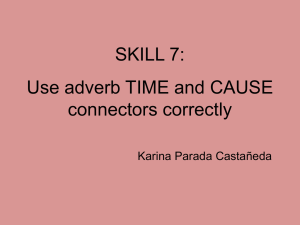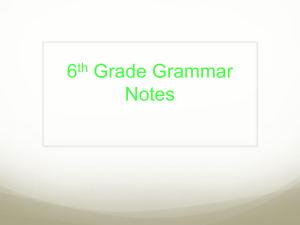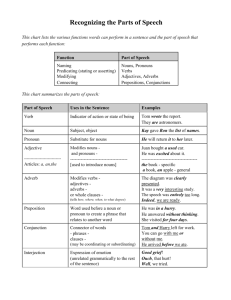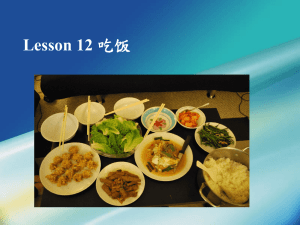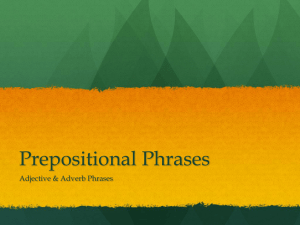spelling words to know
advertisement
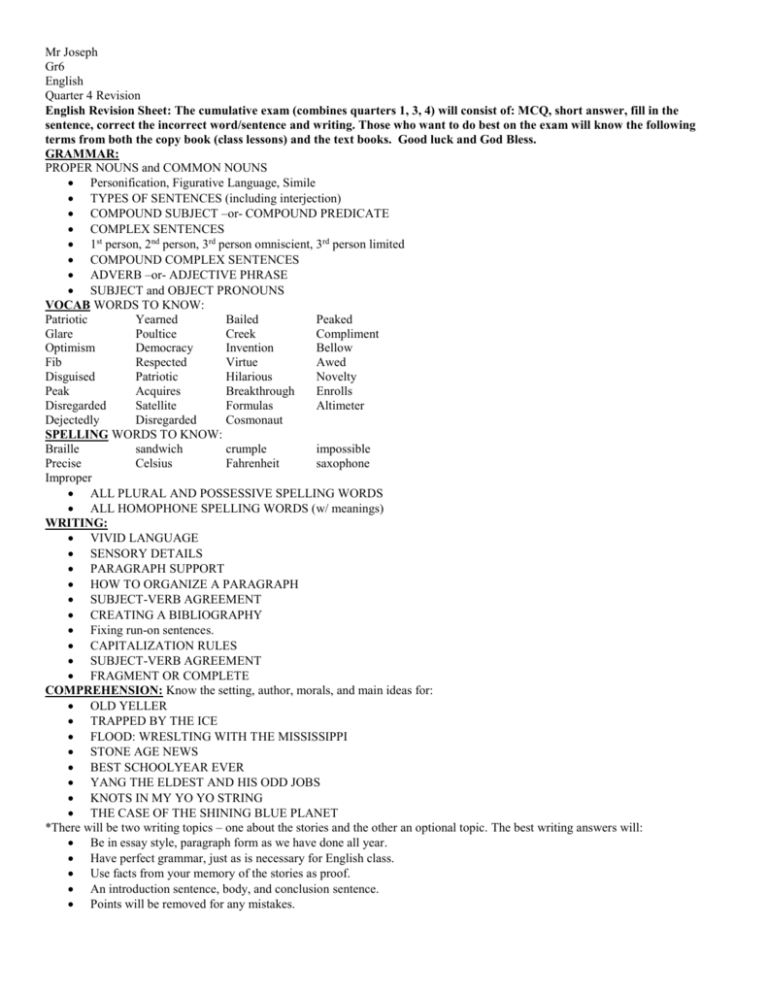
Mr Joseph Gr6 English Quarter 4 Revision English Revision Sheet: The cumulative exam (combines quarters 1, 3, 4) will consist of: MCQ, short answer, fill in the sentence, correct the incorrect word/sentence and writing. Those who want to do best on the exam will know the following terms from both the copy book (class lessons) and the text books. Good luck and God Bless. GRAMMAR: PROPER NOUNS and COMMON NOUNS Personification, Figurative Language, Simile TYPES OF SENTENCES (including interjection) COMPOUND SUBJECT –or- COMPOUND PREDICATE COMPLEX SENTENCES 1st person, 2nd person, 3rd person omniscient, 3rd person limited COMPOUND COMPLEX SENTENCES ADVERB –or- ADJECTIVE PHRASE SUBJECT and OBJECT PRONOUNS VOCAB WORDS TO KNOW: Patriotic Yearned Bailed Peaked Glare Poultice Creek Compliment Optimism Democracy Invention Bellow Fib Respected Virtue Awed Disguised Patriotic Hilarious Novelty Peak Acquires Breakthrough Enrolls Disregarded Satellite Formulas Altimeter Dejectedly Disregarded Cosmonaut SPELLING WORDS TO KNOW: Braille sandwich crumple impossible Precise Celsius Fahrenheit saxophone Improper ALL PLURAL AND POSSESSIVE SPELLING WORDS ALL HOMOPHONE SPELLING WORDS (w/ meanings) WRITING: VIVID LANGUAGE SENSORY DETAILS PARAGRAPH SUPPORT HOW TO ORGANIZE A PARAGRAPH SUBJECT-VERB AGREEMENT CREATING A BIBLIOGRAPHY Fixing run-on sentences. CAPITALIZATION RULES SUBJECT-VERB AGREEMENT FRAGMENT OR COMPLETE COMPREHENSION: Know the setting, author, morals, and main ideas for: OLD YELLER TRAPPED BY THE ICE FLOOD: WRESLTING WITH THE MISSISSIPPI STONE AGE NEWS BEST SCHOOLYEAR EVER YANG THE ELDEST AND HIS ODD JOBS KNOTS IN MY YO YO STRING THE CASE OF THE SHINING BLUE PLANET *There will be two writing topics – one about the stories and the other an optional topic. The best writing answers will: Be in essay style, paragraph form as we have done all year. Have perfect grammar, just as is necessary for English class. Use facts from your memory of the stories as proof. An introduction sentence, body, and conclusion sentence. Points will be removed for any mistakes. GRAMMAR SHEET PROPER NOUNS AND COMMON NOUNS Proper: Proper nouns name specific people, places, things, or ideas. Examples: Britney, Paris, Rover, Nike Since these nouns are naming specific things, they always begin with a capital letter. Sometimes, they contain two or more important words. Examples: Britney Spears, Central Park Zoo, Pacific Ocean If this is the case, both important words are capitalized, and the whole thing is still considered to be one proper noun even though it's made up of more than one word. How about that? Common: Common nouns are the opposite of proper nouns. They are your run of the mill, generic nouns. They name people, places, things or ideas that are not specific. Examples: woman, city, dog, shoe Since these nouns are not naming anything specific, they do not need to start with a capital letter unless they begin a sentence. Their Relationship Every proper noun has a common noun equivalent, but not every common noun has a proper noun equivalent! For example, dust is only a common noun. There is no specific kind of dust, so it's just common. What Can They Do? These nouns can perform any of the noun jobs (subject, direct object, indirect object, object of the preposition, predicate nominative). What is FIGURATIVE LANGUAGE? Whenever you describe something by comparing it with something else, you are using figurative language. Simile A simile uses the words “like” or “as” to compare one object or idea with another to suggest they are alike. Example: busy as a bee Metaphor The metaphor states a fact or draws a verbal picture by the use of comparison. A simile would say you are like something; a metaphor is more positive - it says you are something. Example: You are what you eat. Personification A figure of speech in which human characteristics are given to an animal or an object. Example: My teddy bear gave me a hug. Compound subject and compound predicate COMPOUND SUBJECT AND COMPOUND PREDICATE: A compound subject has two or more subjects connected by a conjunction like and and or. All subjects in a compound subject have the same verb or predicate. A compound predicate has two or more predicates connected by a conjunction. All predicates in a compound predicate have the same subject. Example: The detective and his partner solved the mystery. The compound subject is detective and partner. The simple predicate is solved. Example: He finished the problem and raised his hand. The compound predicate is finished and raised. The simple subject is he. Example: Lois and Ted are going to high school in September and will take algebra as their math course. The compound subject is Lois and Ted. The compound predicate is are going and will take. __________________________________________________________________________________________________________ COMPLEX SENTENCES A sentence that contains an independent clause and at least one dependent clause. A complex sentence is made from an independent clause and a dependent clause joined together. Some examples: After I came home, I made dinner. (dependent clause: "After I came home") (indpendent clause: I made dinner) We visited the museum before it closed. (dependent clause: before it closed.) (independent clause: We visited the museum) COMPOUND-COMPLEX SENTENCES A compound-complex sentence is made from two independent clauses and one or more dependent clauses. Some examples: 1. Although I like to go camping, I haven't had the time to go lately, and I haven't found anyone to go with. independent clause: "I haven't had the time to go lately" independent clause: "I haven't found anyone to go with" dependent clause: "Although I like to go camping... " ********** 2. We decided that the movie was too violent, but our children, who like to watch scary movies, thought that we were wrong. independent clause: "We decided that the movie was too violent" independent clause: "(but) our children thought that we were wrong" dependent clause: who like to watch scary movies ADJECTIVE AND ADVERB PHRASES An adjective phrase is any phrase which modifies a noun or pronoun. I was driven mad by the sound of my neighbor’s constant piano practicing. In this sentence, the prepositional phrase "of my neighbor’s constant piano practicing" acts as an adjective modifying the noun "sound." My father-in-law locked his keys in the trunk of a borrowed car. Similarly in this sentence, the prepositional phrase "of a borrowed car" acts as an adjective modifying the noun "trunk." We saw Peter dashing across the quadrangle. Here the participle phrase "dashing across the quadrangle" acts as an adjective describing the proper noun "Peter." We picked up the records broken in the scuffle. In this sentence, the participle phrase "broken in the scuffle" modifies the noun phrase "the records." Adverb phrases We have already seen that a group of words called an adjective phrase can serve the same purpose as an adjective. In the same way, an adverb phrase can does the work of an adverb. Study the following examples. He spoke politely. (Here the adverb politely says something about the manner in which he spoke.) He spoke in a polite manner. (Here the adverb phrase ‘in a polite manner’ also says how he spoke.) Thus we have seen that an adverb phrase modifies a verb just like an adverb does. It is available now. It is available at the moment. In the pair of sentences given above, the adverb phrase ‘at the moment’ modifies the verb just like the adverb now does. Definition An adverb phrase is a group of words that serves the same purpose as an adverb. Like an adverb, an adverb phrase can also modify an adjective or another adverb. Some adverbs and their equivalent adverb phrases are given below. Bravely (adverb) – in a brave manner (adverb phrase) Beautifully – in a beautiful manner / way / style Formerly – in former times / once upon a time Recently – just now or at a recent date Soon – before very long Here – on this spot Everywhere – in all places Now – at the moment


